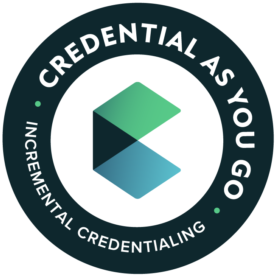
Credential As You Go has acquired three phases of funding to date. Lumina Foundation funded Phase I, resulting in the Incremental Credential Framework for testing. The Institute of Education Sciences, U.S. Department of Education funds Phase II (Grant R305T210063), which focuses on rapid prototyping of and research on incremental credentials with a national campaign. An anonymous private donor fund at the Program on Skills, Credentials & Workforce Policy at George Washington University funds the development of the prototype Learn and Work Ecosystem Library. Walmart funds Phase III, which focuses on systems change for expansion and sustainability of incremental credentials. The opinions expressed are those of the authors and do not represent views of Lumina Foundation, Institute of Education Sciences, the U.S. Department of Education, Walmart, or George Washington University.